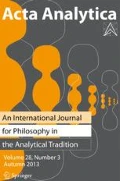Abstract
In this paper, I describe some of the highlights of Melchior’s checking account and then suggest that its explanatory value could be enhanced with a less analyzed concept of checking. This thought inspires a rearguard defense of sensitivity, by no means aiming to rescue it from all its well-known problems, wherein it is suggested that sensitivity fares better as a necessary condition for knowledge when all the bells and whistles with which it has been adorned over the years are stripped away. Finally, I investigate a recognizably Moorean position involving methods that can be construed as sensitive, such that persons using them can claim to have checked that skeptical hypotheses are false.
Similar content being viewed by others
Notes
In “Certainty” (Moore, 1959). He went on, curiously, to doubt that all his sensory experiences, together with his memories, are logically compatible with dreaming. He took memory to be a source of immediate knowledge, unlike sensory experience. Does that help? Only if memories are veridical and can be assumed to be, but what they are immediate knowledge of is one’s past sense experience, not directly of facts about the external world, so I don’t see how it helps.
One final concern, addressed in a note so as not to detract too much from the flow of this section, where my aim is simply to sketch a neo-Moorean response to Melchior, is that [D]Moore’s higher-level method for checking, of their belief that they’re not a BIV that it is true, is not a genuine checking method because it is synchronous with their first-level method of believing they’re not a BIV. Synchronous methods, like checking a second copy of The Times to verify what the first said, always give the same result, and therefore do not constitute genuine checking (KC, 201). [D]Moore can reply that the methods aren’t synchronous because they check different things—the first level method checks whether one is a BIV, and the higher-level method checks whether one’s first-level method has the appropriate warrant. [D]Moore might add that, because good case first-level and higher-level methods are factive, by their nature yielding true beliefs, the concern that synchronous methods are inadequate because they might just get the wrong result twice over, in the same way, is not applicable.
References
Alspector-Kelly, M. (2011). Why safety doesn’t save closure. Synthese, 183(2), 127–142.
Becker, K. (2006). Reliabilism and safety. Metaphilosophy, 37(5), 691–704.
Becker, K. (2006). Is counterfactual reliabilism compatible with higher-level knowledge? Dialectica, 60(1), 79–84.
Becker, K. (forthcoming). Sensitivity, discrimination, and perspective. In: L. Oliveria (Ed.), Externalism about Knowledge. Oxford University Press.
Becker, K. (2018). The sensitivity response to the Gettier problem. In: S. Hetherington (Ed.), Classic philosophical arguments: The Gettier problem (pp. 108–24). Cambridge University Press.
Black, T. (2002). A Moorean response to brain-in-a-vat skepticism. Australasian Journal of Philosophy, 80(2), 148–163.
Black, T. (2008). Defending a sensitive neo-Moorean invariantism. In V. F. Hendricks, & D. Pritchard (Eds.), New Waves in Epistemology (pp. 8–27). Palgrave Macmillan.
Bonjour, L. (1978). Can empirical knowledge have a foundation? American Philosophical Quarterly, 15(1), 1–13.
Conee, E., & Feldman, R. (1998). The generality problem for reliabilism. Philosophical Studies, 89(1), 1–29.
DeRose, K. (1992). Contextualism and knowledge attributions. Philosophy and Phenomenological Research, 52(4), 913–929.
Dretske, F. (1970). Epistemic operators. Journal of Philosophy, 67(24), 1007–1023.
Feldman, R., & Conee, E. (1985). Evidentialism. Philosophical Studies, 48(1), 15–34.
Kripke, S. (2011). Nozick on knowledge. Philosophical Troubles. Collected Papers, (vol I, pp. 162–224). Oxford: Oxford University Press
Luper-Foy, S. (1984). The epistemic predicament: knowledge, Nozickian tracking, and scepticism. Australasian Journal of Philosophy, 62(1), 26–49.
McDowell, J. (1982). Criteria, defeasibility, and knowledge. Proceedings of the British Academy, 68, 455–479.
Melchior, G. (2015). The heterogeneity problem for sensitivity accounts. Episteme, 12(4), 479–496.
Melchior, G. (2019). Knowing and checking (Routledge Studies in Epistemology). Taylor and Francis. Kindle Edition.
Moore, GE. (1959). Certainty. Philosophical Papers (pp. 226–251.). Allen and Unwin
Murphy, P. (2005). Closure failure for safety. Philosophia, 33, 331–334.
Nozick, R. (1981). Philosophical explanations. Harvard University Press.
Pritchard, D. (2005). Epistemic luck. Oxford University Press.
Pritchard, D. (2012). Anti-luck virtue epistemology. Journal of Philosophy, 109(3), 247–279.
Pritchard, D. (2012). Epistemological disjunctivism. Oxford University Press.
Schaffer, J. (2005). Contrastive knowledge. Oxford Studies in Epistemology, 1, 235–271.
Sosa, E. (1999). How to defeat opposition to Moore. Philosophical Perspectives, 13, 141–153.
Vogel, J. (2000). Reliabilism leveled. Journal of Philosophy, 97(11), 602–623.
Vogel, J. (2007). Subjunctivitis. Philosophical Studies, 134(1), 73–88.
Vogel, J. (1987). Tracking, closure and inductive knowledge. In: S. Luper-Foy (Ed.), The Possibility of Knowledge: Nozick and His Critics (pp. 197–215). Rowman and Littlefield.
Wallbridge, K. (2018). Sensitivity, induction, and miracles. Australasian Journal of Philosophy, 96(1), 118–126.
Williamson, T. (2000). Knowledge and its limits. Oxford University Press.
Author information
Authors and Affiliations
Corresponding author
Ethics declarations
Conflict of Interest
The author declares no competing interests.
Additional information
Publisher's Note
Springer Nature remains neutral with regard to jurisdictional claims in published maps and institutional affiliations.
This paper is a significantly revised version of “Balancing the Checking Account,” presented at the book symposium for Knowing and Checking: An Epistemological Investigation on October 27, 2021. Here I pick up on and elaborate the central strands of thought in the conference paper and leave out many smaller points. I thank all the symposium participants, and especially Guido Melchior for the inspiration and for thoughts on my original presentation.
Rights and permissions
Springer Nature or its licensor holds exclusive rights to this article under a publishing agreement with the author(s) or other rightsholder(s); author self-archiving of the accepted manuscript version of this article is solely governed by the terms of such publishing agreement and applicable law.
About this article
Cite this article
Becker, K. Sensitivity: Checking into Knowing?. Acta Anal 38, 27–43 (2023). https://doi.org/10.1007/s12136-022-00529-w
Received:
Accepted:
Published:
Issue Date:
DOI: https://doi.org/10.1007/s12136-022-00529-w


